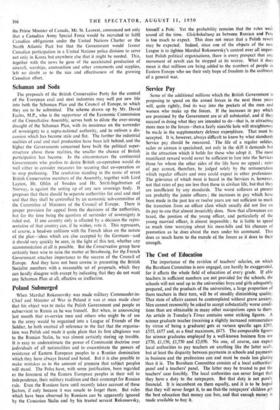Service Pay
Some of the additional millions which the British Government is proposing to spend on the armed forces in the next three years will, quite rightly, find its way into the pockets of the men and women who make up the forces. If the increases in pay which are promised by the Government are at all substantial, and if they succeed in doing what they are intended to do—that is, in attracting more men to the forces—then a fairly sizeable hole will straightaway be made in the supplementary defence expenditure. That must be accepted. It is, however, always difficult to know by what standards Service pay should be measured. " The life of a regular soldier, sailor or airman is specialised, not only in the skill it demands but in the attraction which it holds for those who adopt it. The most munificent reward would never be sufficient to lure into the Services those for whom the other sides of the life have no appeal ; rates of pay cannot; therefore, be judged solely by the remuneration which regular officers and men could expect in other professions. The grievance of which most is heard in the Services is, however, not that rates of pay are less than those in civilian life, but that they are insufficient by any standards. The worst sufferers at present are probably the junior officers ; the increases in pay which have been made in the past ten or twelve years are not sufficient to mark the transition from an officer class which usually did not live on its pay to one that almost invariably does. Now that allowances are taxed, the position of the young officer, and particularly of the young married officer, is almost impossible ; he is liable to spend as much time worrying about his mess-bills and his chances of promotion as he does about the men under his command. This does as much harm to the morale of the forces as it does to their strength.


































 Previous page
Previous page